Dear Vancouver Unitarians,
I have been honoured to serve as President these past two years of change and growth, and also honoured to be asked to stay on as President. I declined the invitation to stay on due to my full time job resuming and other priorities. A UCV President needs a lot of time and energy to focus on their responsibilities, and I am grateful that I had that time and energy.
In my Presidents Report, I would like to begin by thanking each of you for giving me this opportunity to deepen and expand my knowledge of our Unitarian congregation, our faith, and organizational leadership in general. So much has happened…
We all said good-bye to Rev Doctor Steven Epperson at his last (emotional) service, and a celebratory hello to Rev Lara Cowtan. And then we all began this incredible and challenging journey of transition together.
As this was my second time as Board President, I decided to commit myself to a new leadership style that I was introduced to through several books generously loaned to me by Rev Lara Cowtan. Within these books, there is much homage paid to “self-differentiated leadership.” It is a progressive new leadership style that is highly recommended for congregations (and organizations) in transitional periods and times of anxiety. Change goes hand in hand with excitement and anxiety, so this is not a negative judgment; it is simply an honest acknowledgement we have been going through exciting and anxious times.
So I will briefly share with you some ideas around self-differentiated leadership that I have aspired to embody as your President in the hopes that this may provide some clarity and guidance for us to continue to move forward together.
Self-differentiated leaders take a stand, respectfully, in an intense emotional system and they try to be clear about their own personal perspectives, not feigning objectivity, while also remaining genuinely open to listening to other people’s perspectives. Self-differentiated leaders are transparent with their perspectives by defining themselves within the values of the organization, and focus on what is best for the organization, not on being right, and not on trying to make everybody happy. Self-differentiated leaders take maximum responsibility for their own emotional well-being and do not blame others or the context.
And perhaps most importantly – the beauty of this kind of leadership style is that it requires others to self-differentiate, to take responsibility for their own perspectives, and that leads people to dive a little deeper and know themselves a little better, what their values and goals are. It can also raise people’s awareness around why they say and do the things that they say and do, and why they feel the way that they feel in certain situations.
Ultimately, strong trust can be built within this leadership style because everyone is required to take deeper responsibility for their own voice in a self-differentiated system, for their own engagement in the processes, for their own actions, and for their own well-being in the community. The 8th Principle process we undertook at UCV, with small group meetings guided by specific questions and a covenant, is self-differentiated
leadership in action.
This has been an incredible year at UCV. We have completed our first year of transition through a pandemic, and members of our congregation have risen boldly to the occasion.
Huge thanks to our Sunday Morning Tech Team who not only kept us connected and inspired, but managed to engage an even wider audience through their high quality work. I would also like to thank everyone on the Ministerial Transitions Team for their very committed efforts. Special thanks to everyone on our Board of Trustees for their time and contributions this past year; Gordon Gram, Michael O’Neil, Galen Elfert, Carolyn Grant, Jenny Malcolm, Marilyn McVicar, John Boyle, Catherine Ponsford, and Leslie Hill.
Significant progress has been made in deepening our commitment to radical inclusivity and equity with the changes we all decided to make to our Sanctuary. The Sanctuary upgrades were passionately championed by myself and the Board of Trustees to help make our spiritual home more welcoming, inclusive, and reflective of our values, and to be an artistic and spiritual destination within the larger community. We took our inspiration from Rev Steven Epperson’s parting words, and the generosity of a member donor. The Board’s efforts were strongly supported by our active new IBPOC caucus and our youth and young people who are taking a leading role in helping define UCV’s future, keeping us relevant and accessible.
Our hard working Buildings and Grounds committee continues to amaze with how much they get done and how well they do it. From a new heat pump in the admin building (bravo, Hans Elfert!) to our beautiful new chairs in the renovated Sanctuary to the gorgeous grounds we all enjoy, sincere thanks for their ongoing very hard work.
All of our committees and teams continued working through the pandemic. Our Worship Services Committee has experienced an intense year of online services and we are so grateful for their efforts. The Environment, Social Justice and Refugee Teams were as active as they could be, and I am in awe of their ongoing generous work that benefits all of us and the larger community.
I would especially like to thank Rev Lara Cowtan who continues to fearlessly and tirelessly work to help us define and lay our foundation for the future. Her efforts include (I really don’t know how she does it) helping set up and engage with various Teams and Task Forces regarding many aspects of the complex transition work and goal setting, and contributing to the process of creating and implementing our new Organizational Design.
Indeed, this year we as a congregation really invested in ourselves. The New Organizational Design has seen us expand our RE programming for kids and adults significantly with the wonderful Kiersten Moore and Olivia Hall at the helm, and build our administrative and membership/outreach capacity significantly, which has resulted in two amazing new staff people – Derrick O’Keefe and Casey Wallace! Derrick and Casey have really taken on a lot, and are doing amazing work. Huge kudos to them and to Marcus and Gordon – our office and RE staff are stellar, as is our Care Taking Team.
Big, genuine shout-out to Head Caretaker Paul Nash who always works hard, but worked tirelessly on the Sanctuary upgrades. And thank you, too, to our musical staff and choir; you raised our spirits and touched our hearts all year long.
And we have stayed connected beyond Sunday services. There have been many online events – action evenings, Board Forums, coffee hours, committee meetings – so many this year who have stepped up. We organized an All Candidates Meeting during the Federal Election which I moderated and it was live streamed on Youtube, featuring our newly renovated Sanctuary.
I am also happy to have helped organize UCV’s first ever Decolonizing Practices Workshop which was free and open to all members, staff and Board. This was a highlight for me, and has acted as a catalyst for all kinds of anti-oppression programming and follow-up workshops in Anti-Racism and bystander training at UCV.
Our membership’s fulsome engagement is what gives me hope for our UU faith and for our congregation’s future. We do not have a faith without a community that trusts each other enough to engage in honest, respectful dialogue. So let us raise the bar on the conversation. Let us continue to build trust by differentiating ourselves; defining ourselves and our diverse perspectives through our UU values openly with each other, listening actively to each other, and treating each other with respect.
“Judgement is the absence of love” – The Dalai Lama.
Let us define our future together.
In active faith,
Diane Brown, UCV Board President.



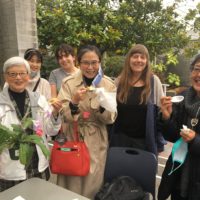
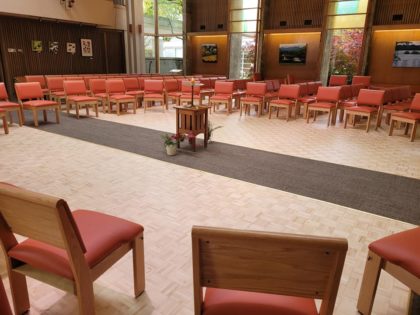
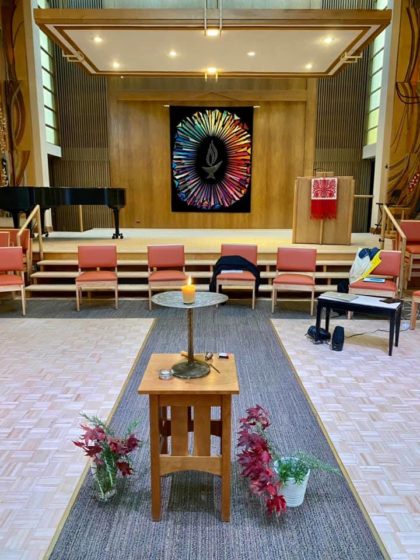
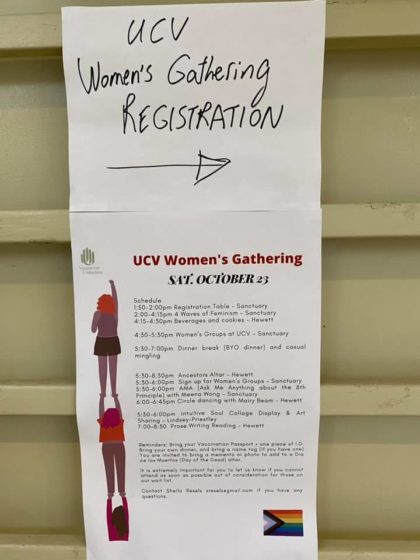
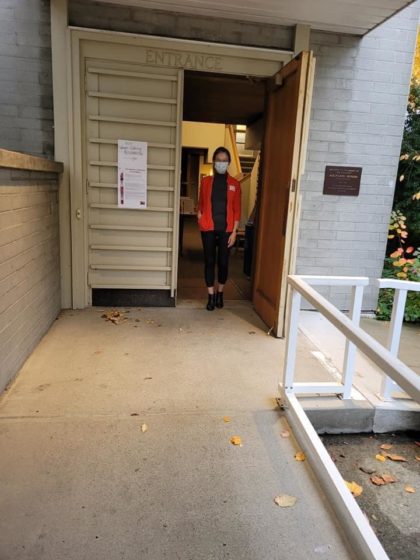 I’ve recently attended UCV’s ‘Women’s Gathering’, and listened to Jo-Anne Elder Gomes present on the first, second, third, and fourth waves of feminism from 1890 and ongoing. These waves have progressed from women’s right to vote, to earn, to dignity, and to a voice. The fifth wave, which is a multi-dimensional movement, recognizes that feminism belongs to us all — regardless of color, religion, age, gender or nationality.
I’ve recently attended UCV’s ‘Women’s Gathering’, and listened to Jo-Anne Elder Gomes present on the first, second, third, and fourth waves of feminism from 1890 and ongoing. These waves have progressed from women’s right to vote, to earn, to dignity, and to a voice. The fifth wave, which is a multi-dimensional movement, recognizes that feminism belongs to us all — regardless of color, religion, age, gender or nationality.
You must be logged in to post a comment.